Unit 9 Can you come to my party? SectionB 知识点学案
文档属性
| 名称 | Unit 9 Can you come to my party? SectionB 知识点学案 |
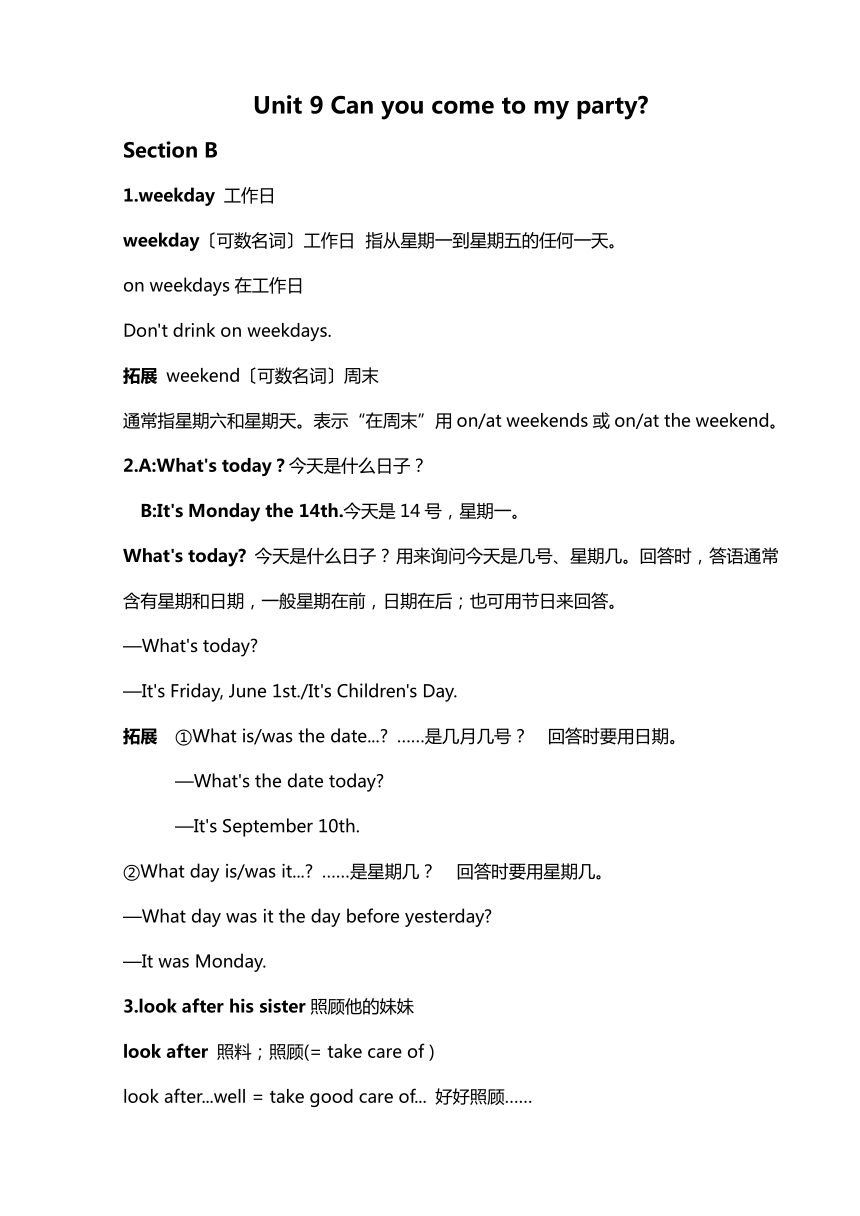
|
|
| 格式 | docx | ||
| 文件大小 | 29.7KB | ||
| 资源类型 | 教案 | ||
| 版本资源 | 人教新目标(Go for it)版 | ||
| 科目 | 英语 | ||
| 更新时间 | 2023-07-09 21:44:03 | ||
图片预览

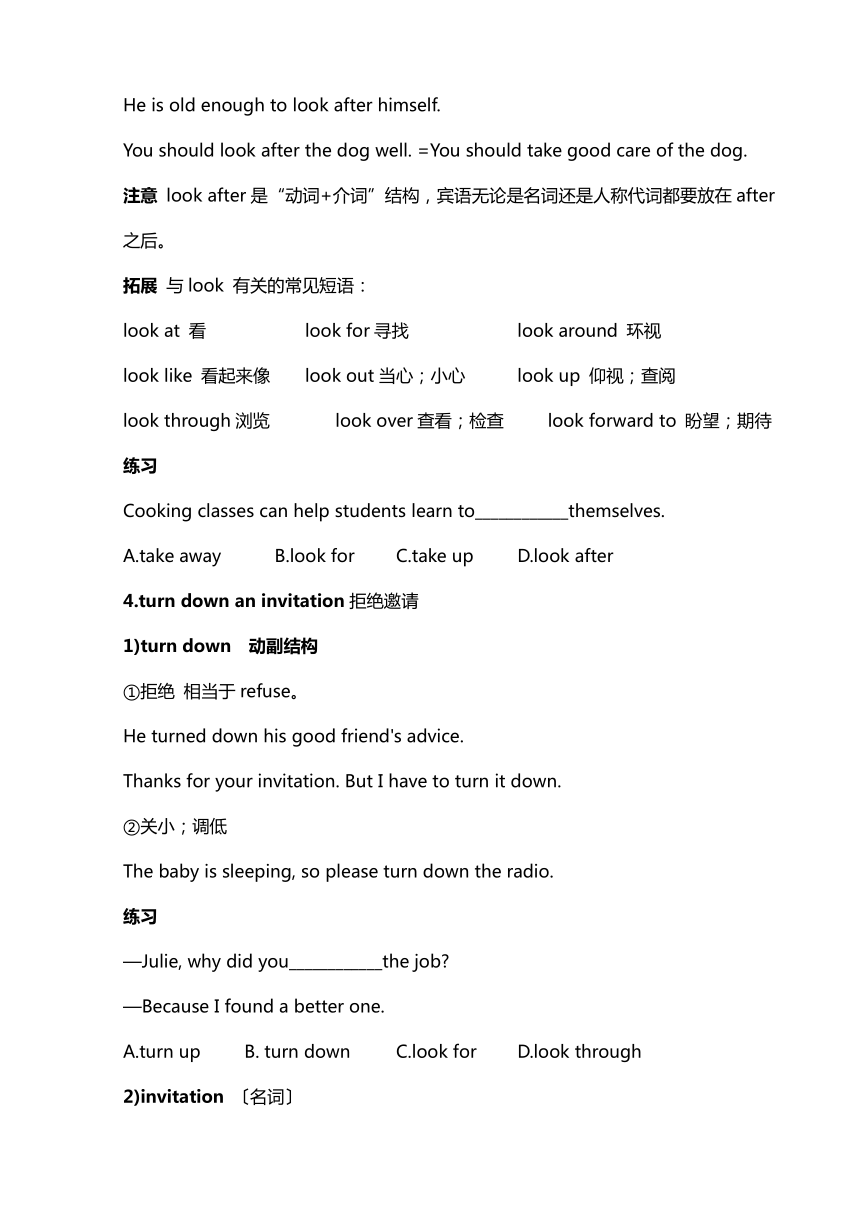
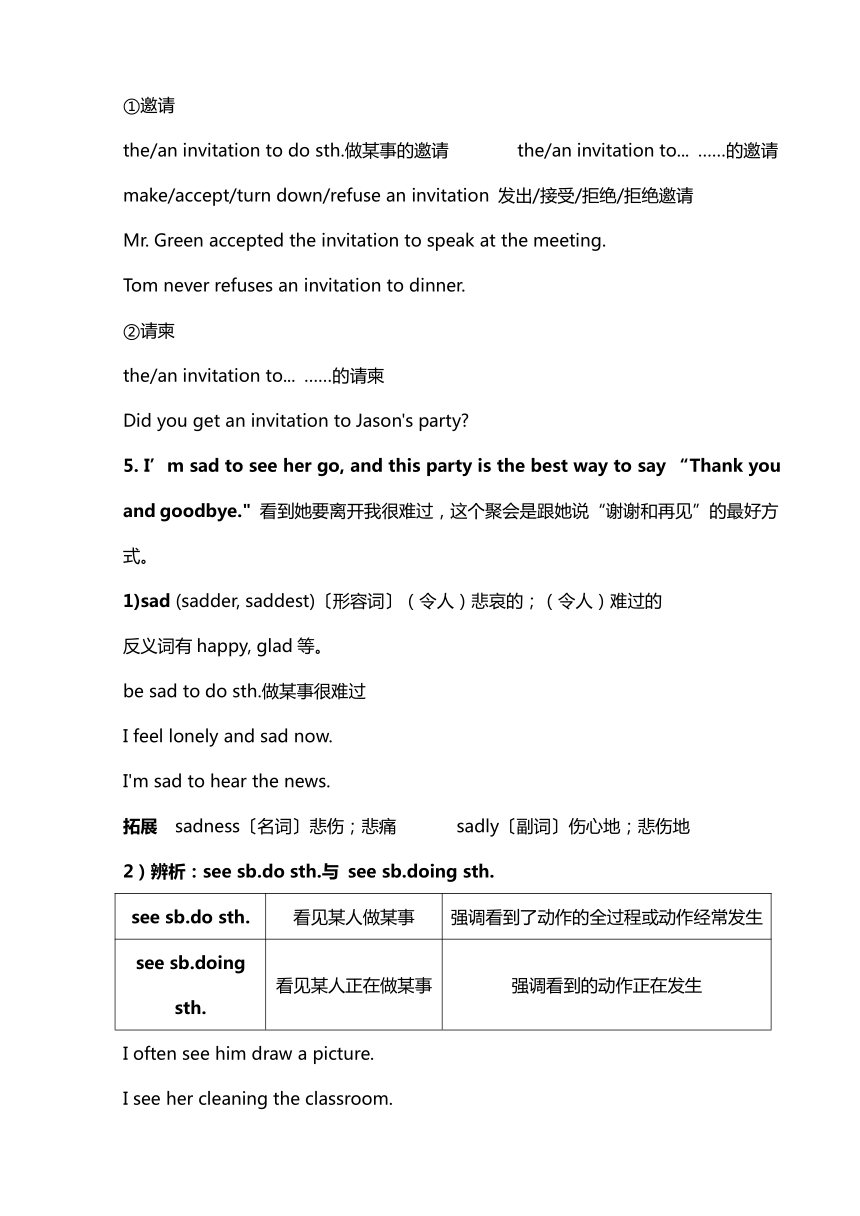
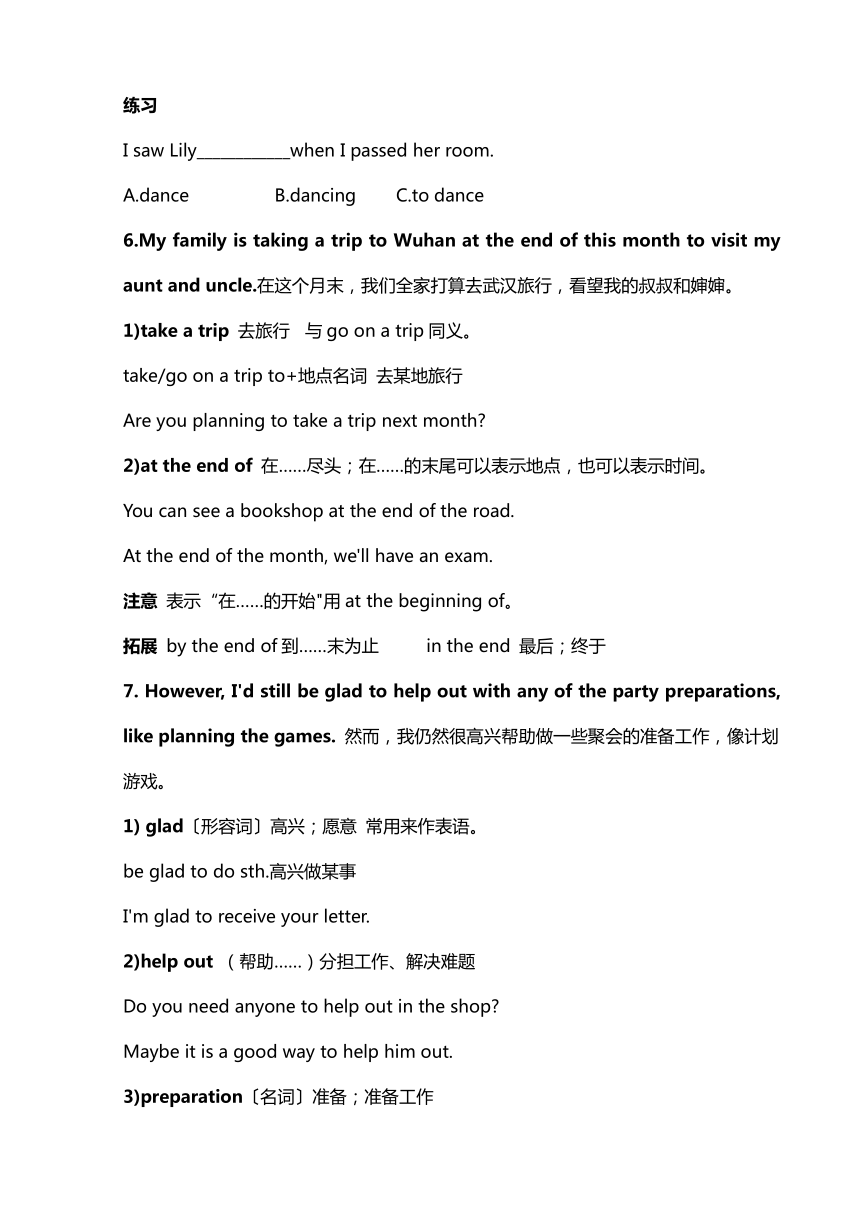
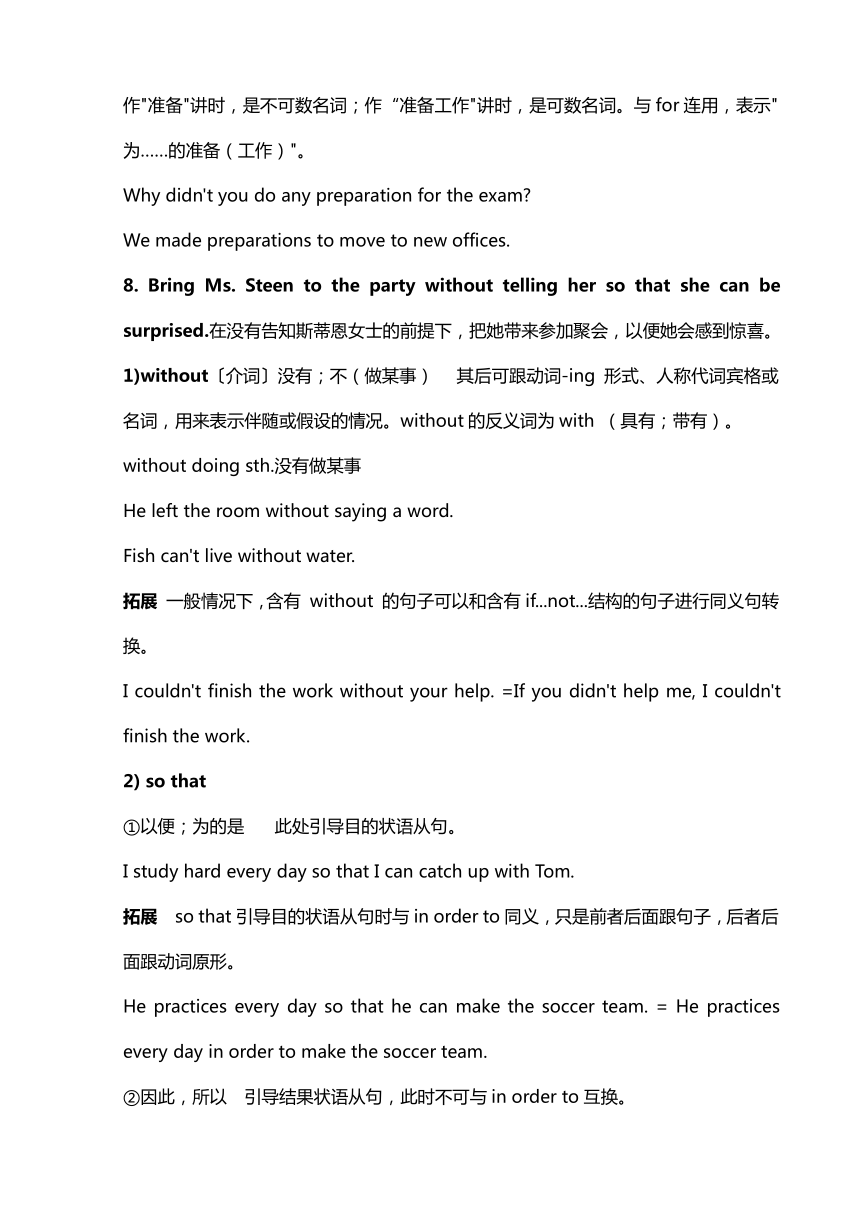
文档简介
Unit 9 Can you come to my party
Section B
1.weekday 工作日
weekday〔可数名词〕工作日 指从星期一到星期五的任何一天。
on weekdays在工作日
Don't drink on weekdays.
拓展 weekend〔可数名词〕周末
通常指星期六和星期天。表示“在周末”用on/at weekends或on/at the weekend。
2.A:What's today?今天是什么日子?
B:It's Monday the 14th.今天是14号,星期一。
What's today 今天是什么日子? 用来询问今天是几号、星期几。回答时,答语通常含有星期和日期,一般星期在前,日期在后;也可用节日来回答。
—What's today
—It's Friday, June 1st./It's Children's Day.
拓展 ①What is/was the date... ……是几月几号? 回答时要用日期。
—What's the date today
—It's September 10th.
②What day is/was it... ……是星期几? 回答时要用星期几。
—What day was it the day before yesterday
—It was Monday.
3.look after his sister照顾他的妹妹
look after 照料;照顾(= take care of )
look after...well = take good care of... 好好照顾……
He is old enough to look after himself.
You should look after the dog well. =You should take good care of the dog.
注意 look after是“动词+介词”结构,宾语无论是名词还是人称代词都要放在after之后。
拓展 与look 有关的常见短语:
look at 看 look for寻找 look around 环视
look like 看起来像 look out当心;小心 look up 仰视;查阅
look through浏览 look over查看;检查 look forward to 盼望;期待
练习
Cooking classes can help students learn to____________themselves.
A.take away B.look for C.take up D.look after
4.turn down an invitation拒绝邀请
1)turn down 动副结构
①拒绝 相当于refuse。
He turned down his good friend's advice.
Thanks for your invitation. But I have to turn it down.
②关小;调低
The baby is sleeping, so please turn down the radio.
练习
—Julie, why did you____________the job
—Because I found a better one.
A.turn up B. turn down C.look for D.look through
2)invitation 〔名词〕
①邀请
the/an invitation to do sth.做某事的邀请 the/an invitation to... ……的邀请
make/accept/turn down/refuse an invitation 发出/接受/拒绝/拒绝邀请
Mr. Green accepted the invitation to speak at the meeting.
Tom never refuses an invitation to dinner.
②请柬
the/an invitation to... ……的请柬
Did you get an invitation to Jason's party
5. I’m sad to see her go, and this party is the best way to say “Thank you and goodbye." 看到她要离开我很难过,这个聚会是跟她说“谢谢和再见”的最好方式。
1)sad (sadder, saddest)〔形容词〕(令人)悲哀的;(令人)难过的
反义词有happy, glad等。
be sad to do sth.做某事很难过
I feel lonely and sad now.
I'm sad to hear the news.
拓展 sadness〔名词〕悲伤;悲痛 sadly〔副词〕伤心地;悲伤地
2)辨析:see sb.do sth.与 see sb.doing sth.
see sb.do sth. 看见某人做某事 强调看到了动作的全过程或动作经常发生
see sb.doing sth. 看见某人正在做某事 强调看到的动作正在发生
I often see him draw a picture.
I see her cleaning the classroom.
练习
I saw Lily____________when I passed her room.
A.dance B.dancing C.to dance
6.My family is taking a trip to Wuhan at the end of this month to visit my aunt and uncle.在这个月末,我们全家打算去武汉旅行,看望我的叔叔和婶婶。
1)take a trip 去旅行 与go on a trip同义。
take/go on a trip to+地点名词 去某地旅行
Are you planning to take a trip next month
2)at the end of 在……尽头;在……的末尾 可以表示地点,也可以表示时间。
You can see a bookshop at the end of the road.
At the end of the month, we'll have an exam.
注意 表示“在……的开始"用at the beginning of。
拓展 by the end of到……末为止 in the end 最后;终于
7. However, I'd still be glad to help out with any of the party preparations, like planning the games. 然而,我仍然很高兴帮助做一些聚会的准备工作,像计划游戏。
1) glad〔形容词〕高兴;愿意 常用来作表语。
be glad to do sth.高兴做某事
I'm glad to receive your letter.
2)help out (帮助……)分担工作、解决难题
Do you need anyone to help out in the shop
Maybe it is a good way to help him out.
3)preparation〔名词〕准备;准备工作
作"准备"讲时,是不可数名词;作“准备工作"讲时,是可数名词。与for连用,表示"为……的准备(工作)"。
Why didn't you do any preparation for the exam
We made preparations to move to new offices.
8. Bring Ms. Steen to the party without telling her so that she can be surprised.在没有告知斯蒂恩女士的前提下,把她带来参加聚会,以便她会感到惊喜。
1)without〔介词〕没有;不(做某事) 其后可跟动词-ing 形式、人称代词宾格或名词,用来表示伴随或假设的情况。without的反义词为with (具有;带有)。
without doing sth.没有做某事
He left the room without saying a word.
Fish can't live without water.
拓展 一般情况下,含有 without 的句子可以和含有if...not...结构的句子进行同义句转换。
I couldn't finish the work without your help. =If you didn't help me, I couldn't finish the work.
2) so that
①以便;为的是 此处引导目的状语从句。
I study hard every day so that I can catch up with Tom.
拓展 so that引导目的状语从句时与in order to同义,只是前者后面跟句子,后者后面跟动词原形。
He practices every day so that he can make the soccer team. = He practices every day in order to make the soccer team.
②因此,所以 引导结果状语从句,此时不可与in order to互换。
The movie is boring so that none of us wants to watch it again.
3)辨析:surprised, surprising与surprise
surprised 形容词 “意外的;惊奇的",说明人的感受 be surprised at对……感到意外/惊奇
be surprised to do sth.对做某事感到意外/惊奇
be surprised that... 对……感到意外/惊奇
surprising 形容词 “令人惊讶的",说明事物具有的特征 --
surprise 名词 “惊奇,惊讶” to one's surprise使某人惊奇的是
in surprise吃惊地
动词 “使吃惊” 多用事物作主语,人作宾语
He was surprised at what he saw.
The news was surprising.
To my surprise, he turned down my invitation.
It surprised me to see so many people there.
练习
We weren't____________that she won the talent competition. She sings very well. (surprise)
9.I look forward to hearing from you all.我期盼着收到你们所有人的答复。
1)look forward to 期待;盼望
其中to为介词,其后可跟名词、代词或动词-ing形式作宾语。
look forward to doing sth.盼望做某事
Cindy is looking forward to her birthday party.
I'm looking forward to buying a new apartment for my parents.
练习
我期待着两个月后的高中生活。
I'm____________ ____________ ____________going to senior high school in two months.
2) hear from sb. 收到某人的信、电话等
相当于 receive/get a letter/(telephone)call from sb.。
I heard from my mother last week. =I received/got a letter from my mother last week.
注意 hear的过去式为heard,是不规则变化。
拓展 ①hear of=hear about 听说 I heard of the story.
②write(a letter)to sb.给某人写信 Kate writes to her parents once a month.
③give a(telephone)call to sb.=give sb.a(telephone)call 给某人打电话
练习
昨天早上,我很开心收到了多年未见的朋友的来信。(hear)
To my great joy, I____________ ____________a friend whom I haven't seen for years yesterday morning.
10.Hope you can make it!希望你能参加(聚会)!
make it 是一个在口语中使用频率较高的习语,具有较强的交际功能。主要含义如下:
①能够出席(或到场)
—Can you come to the housewarming party
—I'm sorry. I won't be able to make it.
②在约定时间内赶到 相当于arrive in time。
If we run, we should make it.
③办成某事 相当于 succeed.
After years of hard work, he finally made it.
11.I would like to invite you to the opening of our new library at No.9 High School.我想邀请您来参加第九中学新图书馆的落成典礼。
opening〔可数名词〕开幕式;落成典礼 通常用单数形式。
the opening of... ……的开幕式/落成典礼
Many people like watching the opening of the Olympic Games.
Tom is going to invite me to the opening of the new theater.
拓展 opening hours 营业时间 opening time 开始营业时间
12.Please reply in writing to this invitation by Friday, December 20th.请于12月20日周五前以书面形式回复此邀请。
辨析:reply与answer
reply 指用口头或书面形式回答 用作不及物动词时,常与to搭配,reply to...意为“对……作出回答"
用作及物动词时,意为“回答;回答说”,后常接that从句
answer 是普通用语包括用口头书面或行动回答 既可用作及物动词,也可用作不及物动词,多用于回答问题(answer questions) 或接电话(answer the telephone)
I didn't reply to him.
He replied that he might go.
He answered my question.
拓展 reply〔名词〕回答;答复
I asked him, but he gave no reply.
13.Daytime 白天
daytime〔不可数名词〕白天;日间 in/during the daytime 在白天
The park is open in/during the daytime.
知识梳理
用法集萃
1.prepare to do sth.准备做某事 refuse to do sth.拒绝做某事
would like to do sth.想/愿意做某事
2.be sad to do sth.对做某事感到难过 be glad to do sth.对做某事感到高兴
3.the best way to do sth.做某事的最佳方式 the best time to do sth. 做某事的最佳时间
4. thanks for doing sth. 感谢做某事 without doing sth.没有做某事
look forward to doing sth.期盼做某事 5.see sb. do sth.看见某人做某事
see sb. doing sth.看见某人正在做某事 6.invite sb.to do sth.邀请某人做某事
7. help sb.(to)do sth.帮助某人做某事 8.one of+限定词+可数名词复数 ……之一
9.what引导的感叹句结构:What+a/an +形容词+可数名词单数(+主语+谓语)!
What+形容词+可数名词复数/不可数名词(+主语+谓语)!
10.What's today?今天是什么日子?
11.—Can you come to+地点? 你能来某地吗?
—Sure, I’d love to.当然,我愿意去。/Sorry, I can't... 对不起,我不能……
语法专项
情态动词can表示邀请
情态动词can除了表示能力、许可或猜测,还可以表示邀请;could较can更礼貌、委婉。情态动词 can表示邀请时的用法如下:
1.当用情态动词can 发出邀请时,要用一般疑问句形式,其句式为:
Can+主语+动词原形+其他? Can you come to the concert
2.当用情态动词 can 发出邀请时,其回答分为两类。一类表示接受邀请,另一类表示拒绝邀请。
(1)常见的表示接受邀请的回答:
Sure, I'd love/like to.当然,我很乐意。
Yes, I’d love to.是的,我很乐意。
Sure. Thanks for asking/inviting/you invitation.当然,谢谢邀请。
注意 I'd love/like to中的to不可以省略。
(2)常见的表示拒绝邀请的回答:
Sorry. /I'm sorry.../I'd love (或like) to, but...对不起。/对不起……/我乐意去,但是……
I'm sorry. I have to look after my sister.
I'd love to, but I'm afraid I can’t. I have to study for an English test.
拓展 向别人发出邀请、请求、建议或征求别人的意见时,还有几种表达方式,语气比较委婉,显得客气而有礼貌。
句型结构 含义 例句
Let's+do sth. 咱们做某事吧。 Let's go shopping.
Shall we+do sth. 我们做某事好吗? Shall we go out for a walk
Would you mind (not) +doing sth. 你介意 (不) 做某事吗? Would you mind closing the door
How/What about doing sth. 做某事怎么样? How about playing basketball
You'd better(not) do sth. 你最好(不要)做某事。 You'd better not read such books.
Why don't you do sth. /Why not do sth. (你/你们)为什么不做某事呢? Why don't you ask your teacher =Why not ask your teacher
Would you like (not) to do sth. 你愿意(不)做某事吗? Would you like to have a rest
Would/Could you please (not) do sth. 请你(不要) 做某事好吗? Would you please wait for me
练习
—Can you come over to my house for dinner
—____________.Shall I bring anything
A.Perhaps next time B.Have a nice meal D.It depends C.Yes,I'd like to
语法专练
1.—Can you____________to my house to watch CDs
—Yes, I'd love to.
A.come B.comes C.coming D.to come
2.—____________you come to my party this evening
—Sorry, I can't. I have to prepare for my exams.
A.Must B.Can C.Need D.Shall
3.—Can you go to the movies with us tomorrow night
—____________.
A.Sure, I'm busy B.Sure,I'd love to C.Sorry, I'd love to D. I'm sorry I can
4.—Can you go to the supermarket this weekend
—____________.I have to help my parents with housework.
A.Sure,I'd love to B.I'm afraid so C.I'm afraid not D.Sure, I love it
Section B
1.weekday 工作日
weekday〔可数名词〕工作日 指从星期一到星期五的任何一天。
on weekdays在工作日
Don't drink on weekdays.
拓展 weekend〔可数名词〕周末
通常指星期六和星期天。表示“在周末”用on/at weekends或on/at the weekend。
2.A:What's today?今天是什么日子?
B:It's Monday the 14th.今天是14号,星期一。
What's today 今天是什么日子? 用来询问今天是几号、星期几。回答时,答语通常含有星期和日期,一般星期在前,日期在后;也可用节日来回答。
—What's today
—It's Friday, June 1st./It's Children's Day.
拓展 ①What is/was the date... ……是几月几号? 回答时要用日期。
—What's the date today
—It's September 10th.
②What day is/was it... ……是星期几? 回答时要用星期几。
—What day was it the day before yesterday
—It was Monday.
3.look after his sister照顾他的妹妹
look after 照料;照顾(= take care of )
look after...well = take good care of... 好好照顾……
He is old enough to look after himself.
You should look after the dog well. =You should take good care of the dog.
注意 look after是“动词+介词”结构,宾语无论是名词还是人称代词都要放在after之后。
拓展 与look 有关的常见短语:
look at 看 look for寻找 look around 环视
look like 看起来像 look out当心;小心 look up 仰视;查阅
look through浏览 look over查看;检查 look forward to 盼望;期待
练习
Cooking classes can help students learn to____________themselves.
A.take away B.look for C.take up D.look after
4.turn down an invitation拒绝邀请
1)turn down 动副结构
①拒绝 相当于refuse。
He turned down his good friend's advice.
Thanks for your invitation. But I have to turn it down.
②关小;调低
The baby is sleeping, so please turn down the radio.
练习
—Julie, why did you____________the job
—Because I found a better one.
A.turn up B. turn down C.look for D.look through
2)invitation 〔名词〕
①邀请
the/an invitation to do sth.做某事的邀请 the/an invitation to... ……的邀请
make/accept/turn down/refuse an invitation 发出/接受/拒绝/拒绝邀请
Mr. Green accepted the invitation to speak at the meeting.
Tom never refuses an invitation to dinner.
②请柬
the/an invitation to... ……的请柬
Did you get an invitation to Jason's party
5. I’m sad to see her go, and this party is the best way to say “Thank you and goodbye." 看到她要离开我很难过,这个聚会是跟她说“谢谢和再见”的最好方式。
1)sad (sadder, saddest)〔形容词〕(令人)悲哀的;(令人)难过的
反义词有happy, glad等。
be sad to do sth.做某事很难过
I feel lonely and sad now.
I'm sad to hear the news.
拓展 sadness〔名词〕悲伤;悲痛 sadly〔副词〕伤心地;悲伤地
2)辨析:see sb.do sth.与 see sb.doing sth.
see sb.do sth. 看见某人做某事 强调看到了动作的全过程或动作经常发生
see sb.doing sth. 看见某人正在做某事 强调看到的动作正在发生
I often see him draw a picture.
I see her cleaning the classroom.
练习
I saw Lily____________when I passed her room.
A.dance B.dancing C.to dance
6.My family is taking a trip to Wuhan at the end of this month to visit my aunt and uncle.在这个月末,我们全家打算去武汉旅行,看望我的叔叔和婶婶。
1)take a trip 去旅行 与go on a trip同义。
take/go on a trip to+地点名词 去某地旅行
Are you planning to take a trip next month
2)at the end of 在……尽头;在……的末尾 可以表示地点,也可以表示时间。
You can see a bookshop at the end of the road.
At the end of the month, we'll have an exam.
注意 表示“在……的开始"用at the beginning of。
拓展 by the end of到……末为止 in the end 最后;终于
7. However, I'd still be glad to help out with any of the party preparations, like planning the games. 然而,我仍然很高兴帮助做一些聚会的准备工作,像计划游戏。
1) glad〔形容词〕高兴;愿意 常用来作表语。
be glad to do sth.高兴做某事
I'm glad to receive your letter.
2)help out (帮助……)分担工作、解决难题
Do you need anyone to help out in the shop
Maybe it is a good way to help him out.
3)preparation〔名词〕准备;准备工作
作"准备"讲时,是不可数名词;作“准备工作"讲时,是可数名词。与for连用,表示"为……的准备(工作)"。
Why didn't you do any preparation for the exam
We made preparations to move to new offices.
8. Bring Ms. Steen to the party without telling her so that she can be surprised.在没有告知斯蒂恩女士的前提下,把她带来参加聚会,以便她会感到惊喜。
1)without〔介词〕没有;不(做某事) 其后可跟动词-ing 形式、人称代词宾格或名词,用来表示伴随或假设的情况。without的反义词为with (具有;带有)。
without doing sth.没有做某事
He left the room without saying a word.
Fish can't live without water.
拓展 一般情况下,含有 without 的句子可以和含有if...not...结构的句子进行同义句转换。
I couldn't finish the work without your help. =If you didn't help me, I couldn't finish the work.
2) so that
①以便;为的是 此处引导目的状语从句。
I study hard every day so that I can catch up with Tom.
拓展 so that引导目的状语从句时与in order to同义,只是前者后面跟句子,后者后面跟动词原形。
He practices every day so that he can make the soccer team. = He practices every day in order to make the soccer team.
②因此,所以 引导结果状语从句,此时不可与in order to互换。
The movie is boring so that none of us wants to watch it again.
3)辨析:surprised, surprising与surprise
surprised 形容词 “意外的;惊奇的",说明人的感受 be surprised at对……感到意外/惊奇
be surprised to do sth.对做某事感到意外/惊奇
be surprised that... 对……感到意外/惊奇
surprising 形容词 “令人惊讶的",说明事物具有的特征 --
surprise 名词 “惊奇,惊讶” to one's surprise使某人惊奇的是
in surprise吃惊地
动词 “使吃惊” 多用事物作主语,人作宾语
He was surprised at what he saw.
The news was surprising.
To my surprise, he turned down my invitation.
It surprised me to see so many people there.
练习
We weren't____________that she won the talent competition. She sings very well. (surprise)
9.I look forward to hearing from you all.我期盼着收到你们所有人的答复。
1)look forward to 期待;盼望
其中to为介词,其后可跟名词、代词或动词-ing形式作宾语。
look forward to doing sth.盼望做某事
Cindy is looking forward to her birthday party.
I'm looking forward to buying a new apartment for my parents.
练习
我期待着两个月后的高中生活。
I'm____________ ____________ ____________going to senior high school in two months.
2) hear from sb. 收到某人的信、电话等
相当于 receive/get a letter/(telephone)call from sb.。
I heard from my mother last week. =I received/got a letter from my mother last week.
注意 hear的过去式为heard,是不规则变化。
拓展 ①hear of=hear about 听说 I heard of the story.
②write(a letter)to sb.给某人写信 Kate writes to her parents once a month.
③give a(telephone)call to sb.=give sb.a(telephone)call 给某人打电话
练习
昨天早上,我很开心收到了多年未见的朋友的来信。(hear)
To my great joy, I____________ ____________a friend whom I haven't seen for years yesterday morning.
10.Hope you can make it!希望你能参加(聚会)!
make it 是一个在口语中使用频率较高的习语,具有较强的交际功能。主要含义如下:
①能够出席(或到场)
—Can you come to the housewarming party
—I'm sorry. I won't be able to make it.
②在约定时间内赶到 相当于arrive in time。
If we run, we should make it.
③办成某事 相当于 succeed.
After years of hard work, he finally made it.
11.I would like to invite you to the opening of our new library at No.9 High School.我想邀请您来参加第九中学新图书馆的落成典礼。
opening〔可数名词〕开幕式;落成典礼 通常用单数形式。
the opening of... ……的开幕式/落成典礼
Many people like watching the opening of the Olympic Games.
Tom is going to invite me to the opening of the new theater.
拓展 opening hours 营业时间 opening time 开始营业时间
12.Please reply in writing to this invitation by Friday, December 20th.请于12月20日周五前以书面形式回复此邀请。
辨析:reply与answer
reply 指用口头或书面形式回答 用作不及物动词时,常与to搭配,reply to...意为“对……作出回答"
用作及物动词时,意为“回答;回答说”,后常接that从句
answer 是普通用语包括用口头书面或行动回答 既可用作及物动词,也可用作不及物动词,多用于回答问题(answer questions) 或接电话(answer the telephone)
I didn't reply to him.
He replied that he might go.
He answered my question.
拓展 reply〔名词〕回答;答复
I asked him, but he gave no reply.
13.Daytime 白天
daytime〔不可数名词〕白天;日间 in/during the daytime 在白天
The park is open in/during the daytime.
知识梳理
用法集萃
1.prepare to do sth.准备做某事 refuse to do sth.拒绝做某事
would like to do sth.想/愿意做某事
2.be sad to do sth.对做某事感到难过 be glad to do sth.对做某事感到高兴
3.the best way to do sth.做某事的最佳方式 the best time to do sth. 做某事的最佳时间
4. thanks for doing sth. 感谢做某事 without doing sth.没有做某事
look forward to doing sth.期盼做某事 5.see sb. do sth.看见某人做某事
see sb. doing sth.看见某人正在做某事 6.invite sb.to do sth.邀请某人做某事
7. help sb.(to)do sth.帮助某人做某事 8.one of+限定词+可数名词复数 ……之一
9.what引导的感叹句结构:What+a/an +形容词+可数名词单数(+主语+谓语)!
What+形容词+可数名词复数/不可数名词(+主语+谓语)!
10.What's today?今天是什么日子?
11.—Can you come to+地点? 你能来某地吗?
—Sure, I’d love to.当然,我愿意去。/Sorry, I can't... 对不起,我不能……
语法专项
情态动词can表示邀请
情态动词can除了表示能力、许可或猜测,还可以表示邀请;could较can更礼貌、委婉。情态动词 can表示邀请时的用法如下:
1.当用情态动词can 发出邀请时,要用一般疑问句形式,其句式为:
Can+主语+动词原形+其他? Can you come to the concert
2.当用情态动词 can 发出邀请时,其回答分为两类。一类表示接受邀请,另一类表示拒绝邀请。
(1)常见的表示接受邀请的回答:
Sure, I'd love/like to.当然,我很乐意。
Yes, I’d love to.是的,我很乐意。
Sure. Thanks for asking/inviting/you invitation.当然,谢谢邀请。
注意 I'd love/like to中的to不可以省略。
(2)常见的表示拒绝邀请的回答:
Sorry. /I'm sorry.../I'd love (或like) to, but...对不起。/对不起……/我乐意去,但是……
I'm sorry. I have to look after my sister.
I'd love to, but I'm afraid I can’t. I have to study for an English test.
拓展 向别人发出邀请、请求、建议或征求别人的意见时,还有几种表达方式,语气比较委婉,显得客气而有礼貌。
句型结构 含义 例句
Let's+do sth. 咱们做某事吧。 Let's go shopping.
Shall we+do sth. 我们做某事好吗? Shall we go out for a walk
Would you mind (not) +doing sth. 你介意 (不) 做某事吗? Would you mind closing the door
How/What about doing sth. 做某事怎么样? How about playing basketball
You'd better(not) do sth. 你最好(不要)做某事。 You'd better not read such books.
Why don't you do sth. /Why not do sth. (你/你们)为什么不做某事呢? Why don't you ask your teacher =Why not ask your teacher
Would you like (not) to do sth. 你愿意(不)做某事吗? Would you like to have a rest
Would/Could you please (not) do sth. 请你(不要) 做某事好吗? Would you please wait for me
练习
—Can you come over to my house for dinner
—____________.Shall I bring anything
A.Perhaps next time B.Have a nice meal D.It depends C.Yes,I'd like to
语法专练
1.—Can you____________to my house to watch CDs
—Yes, I'd love to.
A.come B.comes C.coming D.to come
2.—____________you come to my party this evening
—Sorry, I can't. I have to prepare for my exams.
A.Must B.Can C.Need D.Shall
3.—Can you go to the movies with us tomorrow night
—____________.
A.Sure, I'm busy B.Sure,I'd love to C.Sorry, I'd love to D. I'm sorry I can
4.—Can you go to the supermarket this weekend
—____________.I have to help my parents with housework.
A.Sure,I'd love to B.I'm afraid so C.I'm afraid not D.Sure, I love it
同课章节目录
- Unit 1 Where did you go on vacation?
- Section A
- Section B
- Unit 2 How often do you exercise?
- Section A
- Section B
- Unit 3 I'm more outgoing than my sister.
- Section A
- Section B
- Unit 4 What's the best movie theater?
- Section A
- Section B
- Unit 5 Do you want to watch a game show?
- Section A
- Section B
- Unit 6 I'm going to study computer science.
- Section A
- Section B
- Unit 7 Will people have robots?
- Section A
- Section B
- Unit 8 How do you make a banana milk shake?
- Section A
- Section B
- Unit 9 Can you come to my party?
- Section A
- Section B
- Unit 10 If you go to the party, you'll have a grea
- Section A
- Section B
